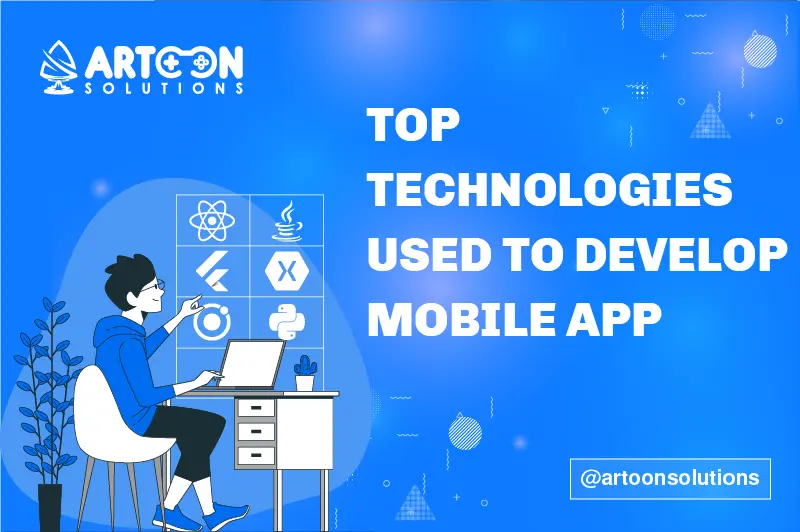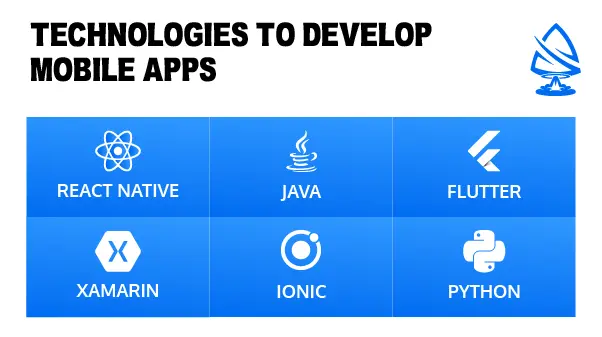- HR:+91-879-9184-787
- Sales:+91-832-0329-068

Mobile apps are the daily drivers in our day-to-day life. No matter how good or bad the day starts, no matter how pressured or relaxed you feel, and no matter how far or near you stay, through mobile app development, we connect with people, share our emotions, experiences and even get to know so many things about the social buzz and current time. Since the COVID-19 pandemic and lockdown situation, mobile app usage has taken a giant leap. It is no wonder why many companies are looking to develop their customized mobile app to manage their business more effectively. So, in this ever-changing technological world, ever wondered what the top technologies used to create mobile apps are?
Let’s explore the top trending mobile app technologies that play a massive role in developing mobile apps.
“Mobile technology” is any technology that enables users to access the internet using their mobile phones. These mobile devices have brought significant changes to the way we communicate with each other. Whether we use tablets or mobile phones, all these mobile technologies operate based on data transmission protocol.
Read More: A Step-By-Step Guide To Mobile App Development
In the current mobile technology, mobile applications can be classified into 3 categories.
Now let’s look at the technologies used to develop mobile apps.

React Native is one of the most popular cross-platform app frameworks, allowing developers to code without worrying about maintaining native iOS or Android apps.
The React Native concept was developed by Facebook and Instagram but is now used to create applications on various computing technologies, including Windows and macOS. The app looks and functions flexibly, depending on the device or browser you’re reviewing.
React Native allows simultaneous development on multiple devices. It also enables seamless scaling without the need to rewrite the codebase. This is thanks to a rebuilt architecture ideal for web developers already familiar with building single-page applications.
JAVA is an object-oriented programming language designed for creating high-performance applications.
One of the oldest programming frameworks is still in use today. Cross-platform capabilities give developers great flexibility in making their apps available on multiple devices, such as smartphones and desktop computers.
Another unique feature of Java is that data structures allow developers to quickly switch between different system parts.

Read More: How Long Does It Take to Develop a Mobile App?
Flutter is the new cross-platform mobile application development technology trending in the city. It uses “Dart” as the programming language instead of JavaScript, enabling quick and effective analysis and creating user interfaces, including highlighting and fixing errors in milliseconds. Google’s open-source, cross-platform SDK extends the wide range of Google-supported plugins to enable the creation of mobile apps for the Android and Apple iOS platforms.
With the benefits of C# coding, this cross-platform framework uses a single code for iOS, Android, Windows, and other platforms. With the help of code sharing, Xamarin builds applications that render the same native app experience. This framework saves the most time and money in mobile app development. Xamarin allows you to deploy native Android, iOS, and Windows apps using a single shared .NET code base. Frameworks provide access to the full range of underlying platform and device functionality, including platform-specific functionality.
Ionic is a framework for building high-performance apps. It has all the necessary functionality, including variables and functions, and even has its built-in speech processor.
Easy to use because it’s template-based, and everything is done in one file. No external library is required. It’s already included by default, which speeds up development. It also reduces future maintenance costs.
Ionic develops Progressive Web Apps (PWA) and hybrid and cross-platform mobile applications using Apache Cordova (PhoneGap) with Angular to enable developers to build Android and iOS applications that work seamlessly together. Widely used for
Ionic’s main advantage is that mobile app developers can use various UI components in the application framework, such as filtering, input, views, action sheets, and simple navigation.
Read More: What Is an Ideal Mobile App Development Process?
Python is a powerful programming language used to manage heavy tasks, including extensive data calculations and web app development in the backend or server-side rendering.
Many companies are now using Python as their first language to develop software applications, AI-based apps, mobile games, and advanced web services. It offers different modules and exciting features like closures. It allows you to isolate pieces of code to run independently or for quick prototyping without needing a finished application.

The future is here! The next generation of the mobile market is buzzing online. Mobile application development has become a part of building a successful business. The technologies mentioned above play a significant role in developing a successful mobile app for your business. Do you need clarification on which technology is best to go with? Well, we are here to help you.
Are you up for a quick discussion on mobile app development?
Let’s do that!
Read More: Top Reasons to Hire Mobile App Development Company in India
Copyright 2009-2024
